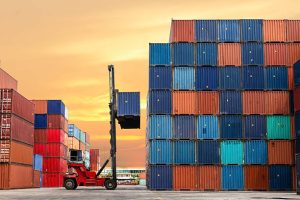Streamlining Your Supply Chain with Rail Transportation: Maximizing Efficiency and Optimizing Business
With the rise of e-commerce and the increasing global demand for goods and services, the need for efficient and effective transportation of goods has become even more critical.
Transporting goods in logistics involves various activities, including selecting the appropriate mode of transportation, such as air, sea, road, or rail, selecting the most efficient routes, ensuring proper packaging and labeling of the goods, and complying with the necessary regulations and documentation.
Table of Contents
Transporting Bulk Goods
Transporting bulk goods is a crucial part of logistics, as many industries rely on the efficient and cost-effective transportation of raw materials and other bulk goods. Bulk goods are typically heavy or large items that are transported in large quantities, such as grains, coal, minerals, chemicals, and liquids. The transportation of bulk goods requires specialized equipment, expertise, and planning to ensure that the goods are transported safely, efficiently, and cost-effectively.
Rail transportation is also a popular mode of transportation for bulk goods. Railcars are designed to transport large quantities of goods, making them an efficient way to move bulk goods over long distances. Rail transportation is often used to transport bulk goods over land, such as coal, grain, and other raw materials.
Road transportation is another option for the transportation of bulk goods, particularly over shorter distances. However, road transportation is typically more expensive than rail or shipping, making it less cost-effective for the transportation of large quantities of bulk goods.
Challenges in transporting bulk goods
Transporting bulk goods presents several challenges that logistics companies and transportation providers need to address to ensure that the goods are transported safely and efficiently. Some of the primary challenges in bulk goods transportation include:
- Packaging and Loading: Proper packaging and loading of bulk goods are essential to ensure that they are transported safely and efficiently. The packaging and loading process should take into consideration the type of goods being transported, the mode of transportation, and the expected environmental conditions during transport. If the goods are not packaged and loaded properly, there is a risk of damage, contamination, or spillage during transport.
- Environmental Factors: Bulk goods transportation can be affected by environmental factors such as weather conditions, temperature, and humidity. For example, extreme temperatures or high humidity can cause spoilage or damage to perishable goods, while wind and rough seas can cause damage to cargo during shipping.
- Security: Bulk goods transportation can be susceptible to theft, particularly if the goods are valuable or high-demand commodities. Security measures such as locks, seals, and tracking devices are essential to deter theft and ensure that the goods are transported safely.
- Transportation Costs: Bulk goods transportation can be costly, particularly if the goods need specialized equipment, such as tankers or containers, or if they require special handling during transport. It is crucial to consider the transportation costs when planning the logistics of bulk goods transportation and to find cost-effective solutions.
- Compliance with Regulations: Transportation of bulk goods is subject to various regulations and legal requirements, such as safety standards, environmental regulations, and customs clearance. Compliance with these regulations can be complex and time-consuming, requiring specialized expertise and documentation.
- Delays: Transportation delays can occur due to various factors, such as weather conditions, border restrictions, mechanical issues, or logistical errors. Delays can cause significant disruptions to the supply chain, resulting in lost revenue and damage to the reputation of the logistics company or transportation provider.
Client situation
The primary mode of delivery for our client’s project relies heavily on trucks, with road transport being the preferred method to move goods from point A to point B. However, due to the distance between the procurement and client sites, the transportation of bulk goods has resulted in increased operational expenses for the client on an annual basis. Additionally, fluctuations in fuel prices and driver availability have added to the existing cost challenges.
Problems faced by client
- Limited Capacity: Road transportation has a limited capacity, which can result in delays and higher transportation costs if demand for transport services exceeds supply.
- Traffic Congestion: Traffic congestion can cause delays and result in increased transportation costs, particularly in urban areas and during peak traffic periods.
- Poor Road Infrastructure: Poor road conditions, such as potholes or inadequate road maintenance, can damage goods in transit and result in additional costs for repairs or replacements.
Our objectives were
- To establish an alternative mode of goods transportation.
- Search for new shipping providers available in the market.
- Proposing the development of new infrastructure at the client’s site to maximize the benefits of a new transportation system.
Methodology
- The project team will use a combination of market research, data analysis, and internal process evaluations to identify areas for improvement.
- We will also engage with suppliers, stakeholders, and customers to gather feedback and implement changes.
Our objectives were
- Accurate forecasting and demand planning was achieved by collecting B2B, stock transfer data for a period of 15 months
- For more efficient data analysis and machine learning, the collected data was cleaned and organized.
Our recommendations to client
- Based on our data analysis we made a list of changes that the client can implement which will improve their business operations
- Our recommendation was to switch to rail transport for long distance transportation of bulk goods.
- The combination of rail and truck transportation is the optimal solution as it allows businesses to benefit from the advantages of both modes of transportation.
- In order to fully leverage the benefits of rail transportation, we proposed implementing some infrastructure development at the client’s site.
- After a thorough analysis of market players, we suggested “XX” as the new operations contractor.
Why we recommended rail transportation
- Cost-effective: Rail transport is generally more cost-effective than road transportation, particularly for long-distance shipments of bulk goods. Rail transport can handle larger volumes of goods, which reduces the cost per unit.
- Efficient: Rail transport is more efficient than road transport as it can carry larger volumes of goods over long distances in a single trip. This reduces the need for multiple trips and the associated costs, including fuel, labour, and maintenance.
- Reliable: Rail transport is more reliable than road transport, as it is not affected by traffic congestion or road conditions. It also has a lower risk of accidents and theft, which makes it a safer option for the transportation of valuable or sensitive goods.
- Flexibility: Rail transport is flexible and can be customized to meet specific transportation needs. This includes providing specialized rail cars for specific goods, such as refrigerated or hazardous materials.
- Reduced Congestion: Rail transport reduces congestion on roads, particularly in urban areas, which can result in faster and more reliable transportation.
Our objectives were
We needed our client to set up infrastructure to benefit from rail transportation. For this we recommend a series of investment such as-
Silos– Construction of 3 additional silos to store the bulk goods on site itself. These silos are weather sealed , moisture controlled and extend the shelf life of our clients products. Additionally the client can store more safety stock in emergency situations which wont hamper production.
In addition, silos can be designed with a variety of features to enhance the efficiency of bulk goods transportation. For example, they can be equipped with pneumatic or mechanical conveyors to transport goods to and from the silo, reducing the need for manual labor. Silos can also be designed with temperature control systems to maintain the quality of temperature-sensitive goods such as seed and feed.
Another advantage of silos is their flexibility. They can be used for both short-term and long-term storage, and can be easily integrated into transportation systems, such as rail or truck transport. This makes silos a versatile solution for a variety of bulk goods transportation needs.
Elevators– They are particularly useful in cases where goods need to be transported vertically, such as between different levels of a building or between storage silos. Elevators are designed to move large quantities of materials quickly and efficiently, which can be beneficial for the transportation of bulk goods.They can also be used in a range of applications, from agricultural products like grain and corn to industrial materials like sand, gravel, and cement.
Elevators also have a small footprint, making them an ideal solution for sites with limited space. They can be installed vertically, requiring minimal floor space, and can be easily integrated into existing storage and transportation systems. Elevators are also a safe and reliable option for transporting bulk goods, as they are designed with safety features to prevent accidents and damage to goods in transit.
In addition to their functional benefits, elevators can also offer environmental benefits. They require minimal energy to operate, particularly if they are designed to work with gravity or utilize regenerative drives, which can help reduce energy consumption and lower associated costs.
Scale -Scales are used to accurately measure the weight of goods, which is important for determining the quantity of goods being transported and for ensuring that the weight is within legal limits.One of the main advantages of using scales in bulk goods transportation is their ability to provide accurate and reliable measurements. This is particularly important for industries such as agriculture, where the weight of crops and other goods can affect pricing and profitability. Scales can also be used to ensure that trucks and other transportation vehicles are not overloaded, which can reduce the risk of accidents and associated costs.
In addition, scales can be used to improve the efficiency of bulk goods transportation. By accurately measuring the weight of goods, transportation companies can optimize the loading and unloading of trucks and other transportation vehicles, reducing the time and cost associated with transportation. Scales can also be used to track the movement of goods, helping companies to monitor and optimize their transportation processes.
New tracks -Firstly, the use of new tracks can improve the efficiency of rail transportation by reducing transit times and increasing the capacity of goods that can be transported in a single trip. This is because new tracks are often designed with improved infrastructure and technology, such as faster trains and higher-capacity freight cars, which can enable faster and more efficient transportation of bulk goods.
New tracks can also help reduce maintenance costs associated with rail transportation. Old tracks can require frequent maintenance and repair, which can result in higher costs and delays in the transportation of goods. New tracks, on the other hand, can be designed with improved materials and technology that can improve their durability and reduce the need for frequent maintenance.
New tracks can be designed with improved safety features, such as automatic train control systems, that can help prevent accidents and improve the overall safety of rail transportation.
Results

After implementing our suggestions our client got short term and long term benefits. These benefits are listed below-
- Relocated shipping point to XX Junction.
- Replaced Z with trucking by X.
- Annual savings of $1.72M($1.12M in Yr1)
Project Conclusion
In conclusion, transporting bulk goods is a complex process that requires careful consideration of many factors, such as cost, speed, efficiency, and safety. The use of rail and road transportation, as well as the use of technologies such as silos, scales, and elevators, can help optimize the transportation of bulk goods and reduce costs.
However, the choice of transportation mode and infrastructure should be made with a thorough analysis of the specific needs and requirements of the business. Furthermore, exploring new supply chain contractors and implementing innovative strategies can further improve the efficiency and effectiveness of bulk goods transportation. By continually evaluating and optimizing their transportation processes, businesses can stay competitive and meet the evolving needs of their customers in a dynamic and rapidly changing global market.
About the Author
 Vivek Sood: Sydney based managing director of Global Supply Chain Group, a strategy consultancy specializing in supply chains. More information on Vivek is available on www.linkedin.com/in/vivek and more information on Global Supply Chain Group is available www.globalscgroup.com
Vivek Sood: Sydney based managing director of Global Supply Chain Group, a strategy consultancy specializing in supply chains. More information on Vivek is available on www.linkedin.com/in/vivek and more information on Global Supply Chain Group is available www.globalscgroup.com
Vivek is the Managing Director of Global Supply Chain Group, a boutique strategy consulting firm specialising in Supply Chain Strategies, and headquartered in Sydney, Australia . He has over 24 years of experience in strategic transformations and operational excellence within global supply chains. Prior to co-founding Global Supply Chain Group in January 2000, Vivek was a management consultant with top-tier strategy consulting firm Booz Allen & Hamilton.
Vivek provides strategic operations and supply chain advice to boards and senior management of global corporations, private equity groups and other stakeholders in a range of industries including FMCG, food, shipping, logistics, manufacturing, chemicals, mining, agribusiness, construction materials, explosives, airlines and electricity utilities.
Vivek has served world-wide corporations in nearly 500 small and large projects on all continents with a variety of clients in many different industries. Most of projects have involved diagnostic, conceptualisation and transformation of supply chains – releasing significant amount of value for the business. His project work in supply chain management has added cumulative value in excess of $500M incorporating projects in major supply chain infrastructure investment decisions, profitable growth driven by global supply chain realignment, supply chain systems, negotiations and all other aspects of global supply chains.
Vivek has written a number of path breaking articles and commentaries that are published in several respected journals and magazines. Vivek has spoken at several supply chain conference, forums and workshops in various parts of the world. He has also conducted several strategic workshops on various aspects of supply chain management. He received his MBA with Distinction from the Australian Graduate School of Management in 1996 and prior to these studies spent 11 years in the Merchant Navy, rising from a Cadet to Master Mariner.
More information on Vivek is available on www.linkedin.com/in/vivek and more information on Global Supply Chain Group is available on www.globalscgroup.com
Related Posts
Click below to see related posts.

The Impact of Plummeting Shipping Container Prices Across Industries
Explore the far-reaching consequences of plummeting shipping container prices on diverse industries, revealing the intricate connections shaping global trade, supply chains, and economic landscapes.

Race Day Logistics: Intricacies of Pit Stop
Explore the race day’s heartbeat: the art of pit stops. Uncover the intricate logistics orchestrating split-second tire changes, refuels, and strategy adjustments that define Formula 1’s high-speed drama.

Mastering Travel Logistics in Formula 1 Racing
Discover the art of flawless travel logistics in the high-speed world of Formula 1. Uncover how precision planning and real-time coordination keep teams on track across the global circuit.
